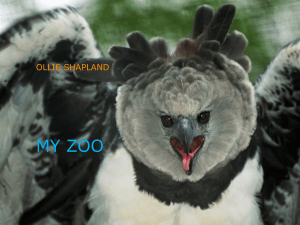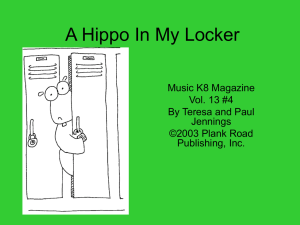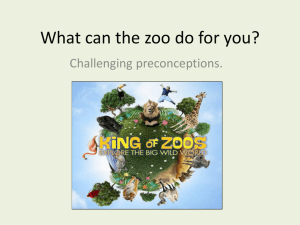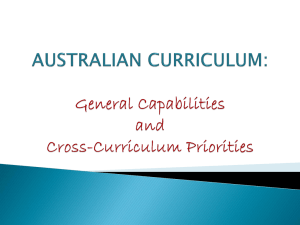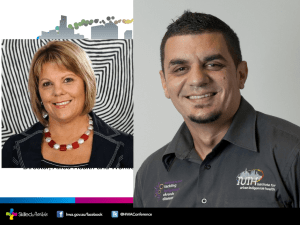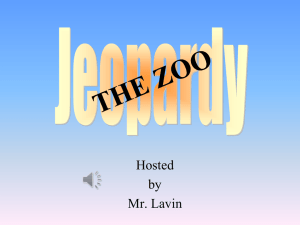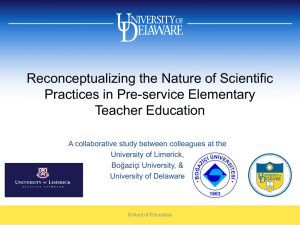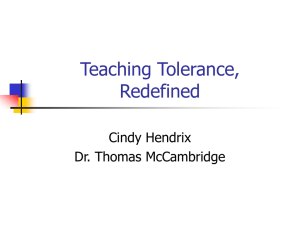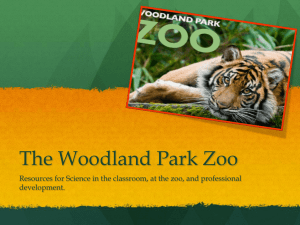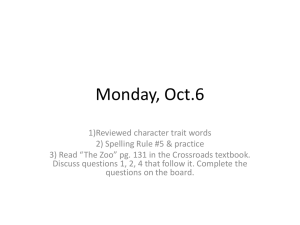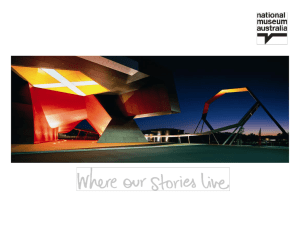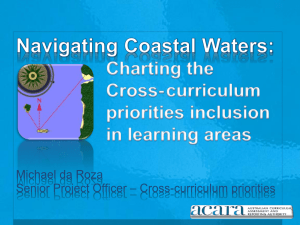PowerPoint - Australian Curriculum Studies Association
advertisement
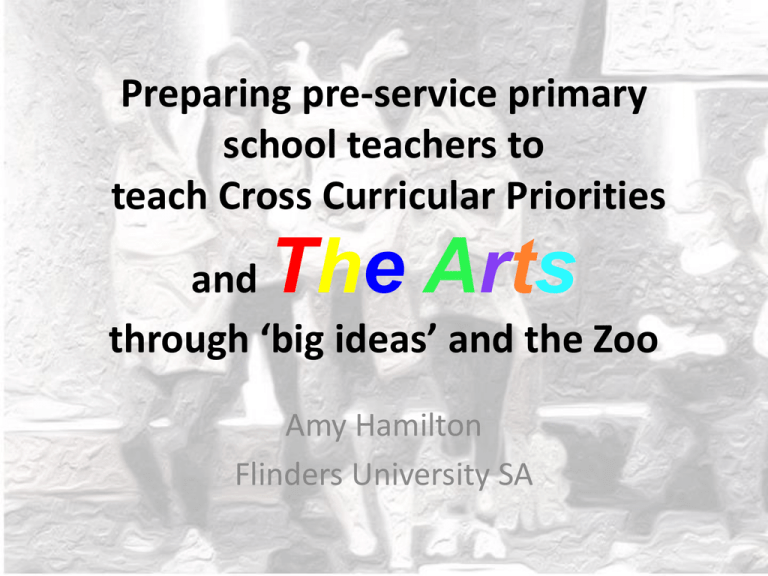
Preparing pre-service primary school teachers to teach Cross Curricular Priorities The Arts and through ‘big ideas’ and the Zoo Amy Hamilton Flinders University SA The Arts The Australian Curriculum • 5 distinct but related art subjects: • dance, drama, media arts, music and visual arts unique forms of creative expression utilising traditional and contemporary methods, styles, techniques. Making and responding Teaching the arts encouraging and motivating primary students to develop to their full potential in and through the arts Pre-service teachers • very little arts background • their own beliefs about the arts, based on their past experiences • attitudes are formed and shaped by experience and these attitudes provide motivation for behaviour • Self-efficacy plays a strong part in teacher confidence or disposition to teach a particular subject Worrying trends • Time for the arts diminished • lack confidence and motivation • Generalist teachers will be expected to teach all five arts subjects until year 6 • Anxiety due to lack of experience • on-going professional development in the arts has been almost nonexistant Australian Curriculum: the arts • Written with generalists in mind • Provides a framework for learning in the arts • Tools • beliefs The Arts How? • The key, according to Eisner (1994) is to create a stimulating environment in which learners can become ‘immersed’. Cross Curriculum Priorities • Aboriginal and Torres Strait Islander histories and cultures, • Asia and Australia’s engagement with Asia, • Sustainability • The arts provide a particularly rich way to promote understanding and sensitivity to cultural and social diversity • promote inclusivity for students who are marginalized or have special needs Through the arts • we can explore ways to respond to local and global problems and issues of human rights and sustainability. • considering arts of a much broader range of cultures helps students to understand the histories and values of these cultures and to reflect on their own. • Recent past-focus on European exemplars in arts Traditional focus in schools on European masters Australian Indigenous artists Traditional and contemporary Arts of Asia Aboriginal and Torres Strait Islander histories and cultures • Generalist teachers – Lack confidence – Little knowledge Aboriginal and Torres Strait Islander histories and cultures Asia and Australia’s engagement with Asia Asia and Australia’s engagement with Asia Asia and Australia’s engagement with Asia • • • • a variety of art forms, media, instruments technologies Sustainability • enables the exploration of the role of arts in maintaining and transforming cultural practices, social systems and the relationship of people to their environment • As catalyst for change – Individual – Collectively – Locally – globally The zoo Pilot study 2013: Partnership with Flinders University Aim: to prepare pre-service teachers to teach the arts and Cross Curriculum Priorities to raise awareness and promote critical thinking about the role of the zoo and the ways that ‘big ideas’ can be used as a starting point in the integration of the arts with other curriculum priorities. The Expressive Arts • a compulsory topic undertaken by 3rd year preservice primary school teachers and 1st year Master of Teaching students • taught by experienced arts educators and supported by three practicing • ‘artists in residence’ • concept of authentic arts education – – – – student creativity, expressive capacities aesthetic sensibilities through experiences that involve arts knowledge and skills The Expressive Arts: 2013 182 pre-service teachers Lecture series 10 weeks Workshops 14 weeks Assessment Concepts Australian Curriculum Children’s development Big Ideas-the zoo Integration Assessment Cross Curriculum priorities Visiting artists (x2) Planning for authentic arts education 5 x 2 hour hand’s on workshops for each arts subject Participation: all workshops On-line reflections Specific content, skills and knowledge Performance and workshop with children time to plan and rehearse Unit and lesson plan Unit and lesson • Plan an integrated unit of work for a specific age group over 10 weeks – Authentic arts skills and knowledge – Integration with a CCP • A detailed lesson from the unit • Formative: resubmission performance • Groups of 10-12 • 10 minute performance at the zoo for a particular age group (primary school children) • Include all arts forms • ‘big idea’ from the zoo and integrating 1 or more CCPs • Followed by a 50 min workshop (in pairs) teaching art skills or knowledge from one of the 5 artforms Movies removed Movie removed Integration • Educators have understood the importance of making meaningful links between subject areas and with a learner’s real life • It is understood that simply taking in facts or data is not as effective for learners as applying knowledge in a meaningful way • Done well an integrated curriculum dissolves boundaries between subjects and enables students to make connections between disciplines Integration and the arts • Effective integration ensures that meaningful learning occurs in all of the integrated subject areas connectedness to real world experiences can engage students more deeply in their learning (Beane 1997). • The arts provide opportunities to learn through multiple forms of literacies such as aural, kinesthetic, and visual and this opens up diverse ways of meaningful learning across subject areas Learning by doing • Participants rather than spectators • Modeling integrated curriculum by doing • Learn about the arts and CCPs as they prepare their performance Learning Design • The Department for Education and Child Development’s (DECD) in South Australia introduced Learning Design as an approach to the Australian Curriculum. • Goal is student understanding and the ability to transfer their learning and make connections between discrete knowledge and skills to make deep meaning The Expressive Arts • aims to model this approach by introducing the ‘big idea’ of The Zoo and Cross Curricular Priorities. • Pre-service teachers demonstrate their understanding of the knowledge and skills that can be learnt in and through all 5 arts subjects and transfer that knowledge through a performance that conveys a strong message about the big ideas Performance as learning • student learning should be a process of forming dispositions, intellectual and emotional and that students as participants are inclined to act to assure best possible outcomes (rather than just good enough). (Dewey 1916/1980) • “only one subject matter for education and that is life” (Whitehead 1929) students Governing bodies teachers parents Pre service teachers institutions education employers ‘habitus’ It leads to patterns that are transferrable from one context to another Pre-service teachers in the role of artist Consciously considering audience ‘experiential learning’ Boud (1993) • Experience Based Learning EBL – Personal engagement with an idea becomes a focus – Makes what is studied a reality – Involves the whole personfeelings, senses and cognition – Evokes awareness and perception and values Reflective practice • Boud (1994) suggest three stages of reflective practice that are essential to EBL the preparation (before) reflection during the process and reflection after the experience. • potential of critical reflection to enhance organizational knowledge • Deep structural shift in basic premises of thoughts, feelings and actions The performances workshops • After the performance • Pre-service teachers in pairs • Small groups in different areas of the zoo All 5 arts subjects-following on from the theme in the performance Data collection • Permission was sought to access pre-service teachers on-line responses to questions and reflections pre and post topic. • Feedback from arts teachers, artists and visiting teachers as well as zoo staff findings • • • • Integration Cross Curriculum priorities The zoo The arts Misconceptions-not known Understanding-learning by doing Performance and workshops • • • • • Positive responses Surprise Pushing limits Gaining confidence Understanding more about what they need to know (workshops) Response to topic overall • • • • Positive Hands-on Value the arts Better understandingintegration, EBL, CCP • Changed attitudes • Role as teacher • As much as I loved the topic I feel with placement coming up Maths and English (instead of the arts) would have been more useful • No performances-it should focus on lesson planning • Hands on stuff won’t help us be better teachers being taught will • (the performance) not sure how worthwhile it was • no real cohesiveness-only need one workshop for general ‘artyness’ (this person admitted to not attending any lectures) • it was fun but too liberal The future • More students • The Zoo and – The Art Gallery of SA – The Museum – Botanic gardens • More arts of Aboriginal Torres Strait Islander content • More arts of Asia content
